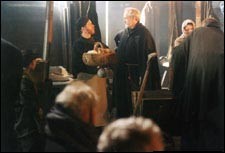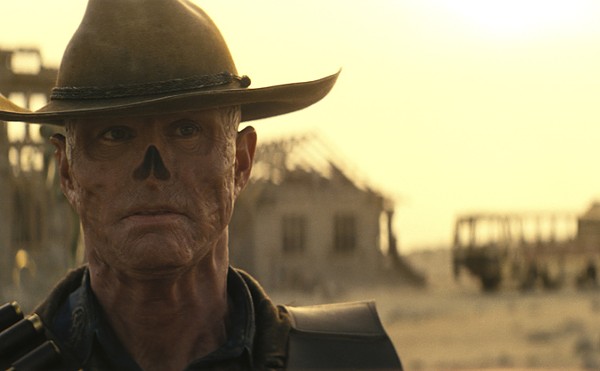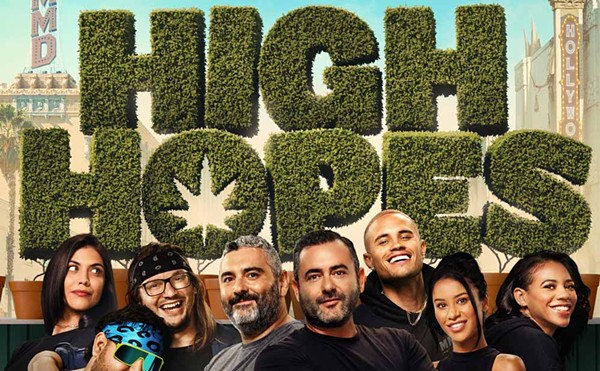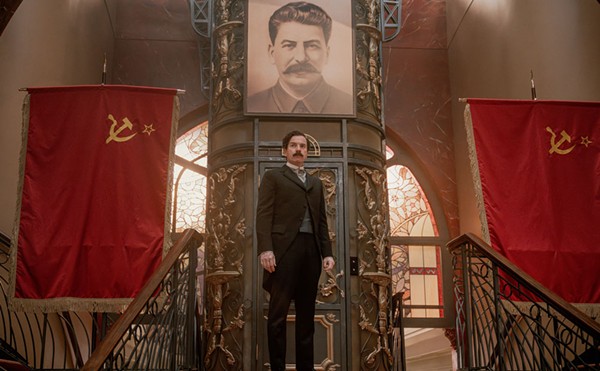The second and final weekend of the Florida Film Festival commenced with a whimper, not a bang, last Friday night, with a screening of "Our God's Brother," the film adaptation of a stage play written by one Karol Wojtyla, now better known as Pope John Paul II. His Holiness, I'm sorry to report, makes a better pontiff than a scribe: His terrible script about one man's quest to redeem the poor consisted almost entirely of interminable philosophical sermons, leaving director Krzysztof Zanussi no room to add any small but revealing touches that might have made the story come alive.
Afterward, star Scott Wilson appeared for a Q&A that was even more pious (pardon the expression). Taking long, studied pauses and choking back tears as he told of his newfound proximity to the sacred, he was lobbed softball queries by a reverent audience that appeared to have received The Word while I was renewing my acquaintance with my the second hand of my watch.
I was comforted by the knowledge that the two representatives of the Central Florida arts community seated at my table (who shall remain nameless to protect them from possible divine retribution) found the entire affair equally ludicrous. If I'm to burn for all eternity, at least I'll be in good company.
Swing salvation
Watching out for lightning bolts, I headed for the Langford Hotel, to see if the godless were having a better time. Indeed they were: A coterie of festival stars and staffers filled the hotel's Empire Room, where Sarah Hayes and Cathy Merkel-Roddy (appropriately decked out in Satanic red and black) assumed the guise of Le Chanteuse and the Bad Ass Belting Babes to hammer out a set of sinful swing. Drink and chatter flowed like lava. Among the partiers were "SlamNation's" Beau Sia (easy to spot in his trusty tank top among the sea of evening wear); radiant "Third Ward Blues" director Heather Korb; and Michael McNamara, Canadian mastermind of "The Cockroach that Ate Cincinnati," who was eagerly bearing witness to what he termed "unfiltered Florida weirdness." Earlier that day, he excitedly told me, he had been taken to view an actual sinkhole. Does this town know how to roll out the red carpet, or what?
Outside looking in
I don't know how any of the revelers managed to be bright and chipper for the following morning's "Filmmaker Forum" at the Enzian, but I later learned that they had converged as planned for a discussion of indie-relevant issues while I was still mercilessly assaulting the "snooze" button. I arrived just in time to nab a quick word with Sam Seder, co-director, -writer and -star of "who's the caboose?" Seder told me that he was interested to see how his scathing satire of television-industry machinations would play to an audience comprised mostly of "outsiders," but quickly added that, in many ways, he's just as out of the loop. A former student of religion and politics who watches little TV himself, he acknowledged that one of the film's gags about the second-tier star status of Christina Applegate had been totally lost on him until it began to draw howls from crowds of the more well-informed.
"I didn't know who Christina Applegate was!" he blurted.
That admission set a healthy, self-effacing tone for the subsequent showing of 1968's "Charly" and a visit from its Oscar-winning star, Cliff Robertson. Pleasantly laid-back in his casual, Southwestern garb, Robertson radiated humility and good humor throughout his opening and closing remarks. "It was harder to play the intelligent part than the stupid part," he joked of his highly regarded portrayal of the film's mentally challenged hero.
He even made playful fun of a technical glitch that interrupted the screening for a good 20 minutes. One of the reels had been loaded backward, and Robertson apologized by noting that the "contagion factor" had visited Charly's addle-headedness upon the projectionist.
The remainder of the afternoon was taken up by a sneak preview of works-in-progess that left widely varying impressions. Some were sufficiently interesting that I wanted to reach for my credit card to facilitate their funding; others had me ready to contribute whatever amount it would take to ensure they were never completed.
Pushing the envelopes
Through it all, everyone's mind was on the evening's Awards Gala at Universal Studios Florida. When night fell and the fete finally arrived, an A-list of festival power players in cocktail-hour black paraded before the cameras on their way to the entrance of Soundstage 33. Somehow, I was let in, too.
Inside, we listened to speeches by the grateful award winners, which were sprinkled like sorbet between courses of the provided dinner. Seymour Cassel took me totally by surprise with a lucid and heartfelt tribute to his "In the Soup" costar, Steve Buscemi, while the montage of clips preceding Wilson's award for Achievement in Acting proved that he had an impressive body of work (as well as the Lord) on his side. The night's only double win went to the documentary "Human Race," which took home the Audience Award for Best Documentary Feature and a Special Jury Award for Compassion and Vision.
Not everyone, however, was enjoying himself. Seated across from me was Todd Phillips, co-director of "Frat House," who volunteered to one of his fellow diners that a week of suffering through Orlando's less-than-adequate recreational amenities had left a bad taste in his mouth.
"We went to Church Street Station," he snickered, selecting what he apparently considered a representative sample of Central Florida nightlife. "It was lame." I never found out what he thought of the salad.
Meanwhile, Cliff Robertson prowled the tables, shaking hands and offering a sincere greeting to anyone willing to receive it. Having racked up more exciting experiences and artistic triumphs in his 70-plus years than most could cram into three lifetimes, he was energetically living out the aphorism that a good time is what you make it.
Final crawl
Running empty by Sunday's closing-day festivities, I nonetheless avoided the temptation to characterize anything that followed as anticlimax. The morning's showing of "In the Soup" presented us with a tale of an idealistic first-time director that had a particular resonance for the 1998 Festival crowd, despite having been lensed a full seven years ago. Cassel was late for the Q&A, leaving the Enzian's Rich Grula to concentrate on fielding questions for Buscemi. Before I was able to suggest scouring area golf courses for the missing thespian, Cassel finally made his way to the stage, explaining away his tardiness by telling us that he was leaving town that day, and didn't have "a woman to pack for him." A female staffer bravely hissed out a disapproving "boo" from the sidelines.
I had originally intended to make the Buscemi/Cassel event my last of the Festival, but I ended up taking an unplanned trip to Colonial Promenade for the 2:45 p.m. screening of "Cockroach," which McNamara had graciously asked me to introduce.
Throughout the week, the Promenade had earned a reputation among some of the filmmakers as a poor substitute for an Enzian showcase. But the audience that showed for this one-time-only projection of McNamara's work compensated for its relatively low numbers by displaying a sophisticated sense of humor, laughing knowingly at even the most arcane of the film's Anglophile-friendly references. Their questions were intelligent as well, with one older gentleman professing his admiration of a hard-to-film traveling shot that had followed star Alan Williams around an entire city block, as he recited a monologue that was as long as the standard 11-minute reel of film would allow.
Enjoying his long-awaited moment in the sun, McNamara ran through as many details of the film's production as he could before his allotted time ran out. I watched from the back row with Lisa Lewenz, director of "A Letter Without Words," who had befriended McNamara earlier in the day, and had mischievously threatened to heckle him through his presentation. Of course she couldn't, and the probing query "Is that your real hair?" went unheard.
As I left, attendees milled about in the Promenade's atrium, getting in their final questions. It seemed a fitting coda for the last 10 days, in which participants and viewers alike had remarked on the warmth and accessibility of the Florida Film Festival. There had been no shoving past walls of agents to steal precious moments with untouchable directors and actors, no atmosphere of power-tripping, no exclusionary, business-oriented condescension. Just a testament to film by, for and of the people, everything that the independent movement is supposed to be about.
I was reminded of something Cliff Robertson had said to me the previous evening at the awards gala, when I had sought him out to express my appreciation of the "Charly" program.
"I know," he had enthused, deflecting my praise onto the crew around him that had made it all possible. "Didn't those guys do a great job?"
| There's even more at the |


















